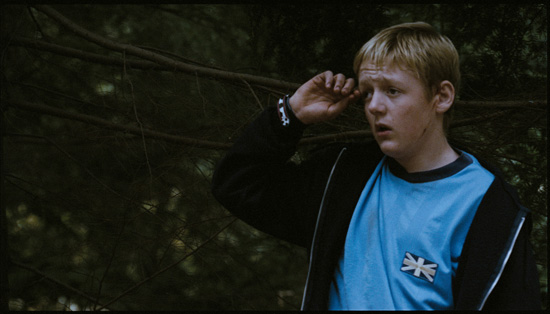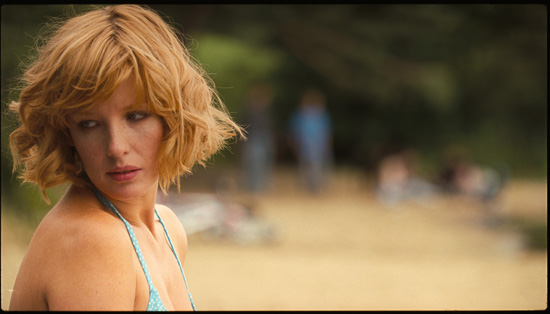According to The Daily Mail the kids are running riot, stabbing wildly in the dark and all too often stabbing each other. Britons today are more frightened of packs of kids in hoodies than the Guy Ritchie style gangsters of yesteryear. James Watkins’ directorial debut, Eden Lake, looks at what happens when one person decides to stand up to these kids and ask them to control their dog.
On a relaxing weekend in the countryside, Steve and Jenny learn that sometimes it’s better to let the youths go about their business rather than end up in a terrifying cat and mouse game played out in the thick under brush of a forest. Eden Lake is a dark, toe-curling ride of terror. It is horrible to watch, all the more so because it is plausible. You can see yourself encountering the young ringleader Brett and his gang in a tube station late at night, or around some corner where you least expect him.
The portrayal of the violence on screen as the stumbling, nervous teenagers try to gain and maintain the respect of their friends is as unsettling as it is accurate. Jack O’Connell’s portrayal of Brett as an unhappy, damaged teenager with no place to vent his frustrations is the stuff of nightmares. His interaction with his "mates" is manipulative and threatening, blackmailing the younger, more impressionable into incriminating themselves in a ritualistic coming of age blood-letting. While one can say that this film is bloody, it’s not gory. It hurts to watch, not because of buckets of blood dripping from trees, but because of the honest, raw depiction of violence. There are no bones sticking out or intestines getting tangled in the branches, just pain which is real and permanent.

Eden Lake is unlike most recent horror films, such as the Saw series or Hostel, which are no more than gorno, which we can watch safe in the knowledge of their fiction. The likelihood of us ever getting stuck in some Eastern European village and tortured for some rich man’s fantasy is slim enough that it isn’t inappropriately voyeuristic. We aren’t forced to relate on any level approaching depth. Instead of inventive make believe mutilation Eden Lake blurs the line between the screen and the streets.
One almost questions whether Eden Lake is strictly a horror film, as it runs more like a nightmarish documentary; there is nothing to distance yourself from this scenario. Our world isn’t populated by the nuclear mutants of The Hills Have Eyes, backwood inbreeds of Texas Chainsaw Massacre or even downright insaniacs like Jason or Michael Myers. This is pure, unnerving, nasty, brutal crime, bringing it closer to the unhinged exploits of Norman Bates or Mark Lewis of Peeping Tom, the type of people you might encounter on a daily basis that you can’t walk away from. Brett stands on that corner in front of Chicken Cottage every night, you can either cross the street or walk past him. But you can’t make him go away. This is also the key difference between Eden Lake and most other "lost in the wilderness" type horror films, such as Wolf Creek or even Deliverance, which take place in far flung places inhabited by reclusive villains. Eden Lake is within driving distance and the villains are all too familiar.
But is Eden Lake a moral tale? Are we supposed to read social commentary into this highly-topical premise? Watkins says this is an "extreme paranoid fantasy", an "exploration of people’s fears". But is he implying that the plot is not plausible, that it is simply a delusional product of the kind of middle class fear that erects gated communities and cc-tv towers? If he is in fact just pushing our buttons then he certainly succeeds in doing so. I don’t often go to the movies to be reminded of the fact that someone was just stabbed seven times in the back behind my local. Thanks to Eden Lake, I am now more aware of the kids that congregate across the street from my flat, than I was this time last week.

Watkins seems to feel that we shouldn’t fault the kids for their crimes nor should we sympathise too much with Steve and Jenny. While ultimately no one in this film is innocent, and more than one of the acts of violence are adults assaulting children, I don’t see how this levels the field and makes the various acts balance out. As the film progresses, Steve and Jenny show us that it is not just the kids who are capable of brutality. But are their crimes any more offensive than the gang’s reaction to a dog’s death? The feral-like retaliation for Steve’s accidental, killing of Brett’s dog is extreme. When Jenny takes things to a new level, you understand her actions and even with our power of hindsight, we empathise with her panic and fear. The film is all the more effective because, in a similar way to Straw Dogs, you begin to wonder what heinous acts of violence you personally are capable of if pushed to similar limits. Even when it is not always clear what’s right, its usually quite clear cut what’s wrong.
Comparisons with other films and social commentary aside and despite how jaded I am at the sight of caro syrup or knives glinting in the moonlight, I jumped… a few times. My toes hurt from making fists and I needed a cigarette afterwards. To me that’s worth the price of admission every time.


